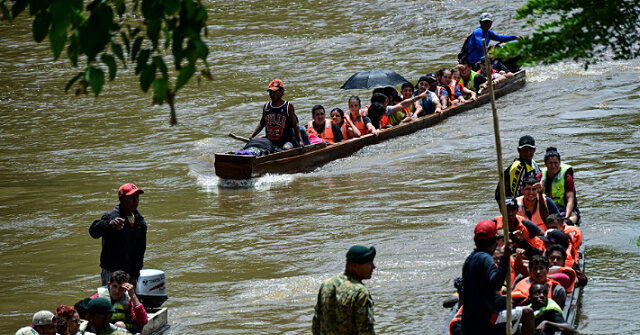Amidst the turbulent political landscape in Venezuela, a significant surge in U.S.-bound migrants has been documented by Panama’s Migrant Authority, particularly through the perilous Darién Gap jungle trail. In September, the number of migrants traversing this dangerous route increased sharply, primarily fueled by Venezuelans fleeing the oppressive regime following the fraudulent presidential election held on July 28. President José Raúl Mulino’s administration, while newly installed in July 2024, seeks to mitigate this influx. The Darién Gap, a key migratory path connecting South and Central America, has become a vital transit point for hundreds of thousands of migrants. In 2023 alone, 520,085 migrants were recorded crossing this treacherous terrain.
The statistics reveal a stark reality, with a notable rise in September where 25,111 migrants crossed the Darién Gap. This figure reflects a 51.23 percent increase from the previous month, significantly highlighting the mounting urgency of the situation. Venezuelans constitute a substantial majority of these migrants, making up 78.83 percent of the total crossings, which amounts to approximately 19,800 individuals in September. This sustained exodus is part of the broader Venezuelan migrant crisis, described as one of the worst in the Western Hemisphere, rivaling only the major crises seen in regions like Syria and Ukraine. Over the past decade, nearly eight million Venezuelans have fled their country, largely due to the devastating impacts of a collapsing socialist regime.
The political tumult in Venezuela, particularly following the July 2024 elections, has accelerated emigration. Reports from organizations like Refugees International indicate that the crackdown on dissent after the fraudulent elections has contributed to this spike in migration. Faced with an oppressive regime led by Nicolás Maduro, who manipulated the election process, many Venezuelans feel a desperate need to escape. The elections, characterized by a lack of genuine competition and widespread allegations of electoral fraud, have served as a catalyst for protests and governmental repression. The brutal responses to dissent, including casualties and mass detentions, have led many to seek safety in other countries.
In the wake of the electoral crisis, neighboring nations are also witnessing an increase in Venezuelan refugees. For instance, Brazil, under the far-left leadership of President Luiz Inácio Lula da Silva, has seen a rise in the number of migrants crossing its borders. While Lula has vowed to support those fleeing Mother Venezuela, he has expressed hopes for a swift return to normalcy in the country, emphasizing the eventual repatriation of these migrants. Meanwhile, President Mulino of Panama has characterized the migrant flow as a significant global concern, asserting that the volume of individuals passing through Panama effectively makes the U.S. border a problem for his nation.
In light of these challenges, the Mulino administration has implemented several measures aimed at curbing migration through the Darién Gap. This includes erecting barbed wire fences along popular migration routes and dismantling specific services that facilitate passage, particularly for migrants from China. Additionally, Panama has forged agreements with the U.S. for deportation flights, though Venezuelans are exempt from deportation under these terms due to the lack of diplomatic recognition of their government by Panama. The concerns voiced by President Mulino regarding limited resources have led to calls for international cooperation to address the escalating migrant crisis.
The complex dynamic surrounding Venezuela’s migrant crisis continues to unfold as international attention and regional responses evolve. With human rights organizations highlighting the dire conditions faced by those fleeing oppression, the need for a coordinated response becomes increasingly urgent. The international community’s role, alongside regional efforts to manage and support the flow of migrants, will significantly impact the future of countless individuals seeking safety and a chance for a better life amid the upheaval wrought by the Maduro regime. The journey through the Darién Gap remains a testament to the desperate circumstances stemming from political turmoil, as the plight of these migrants underscores the broader humanitarian crisis at hand.

